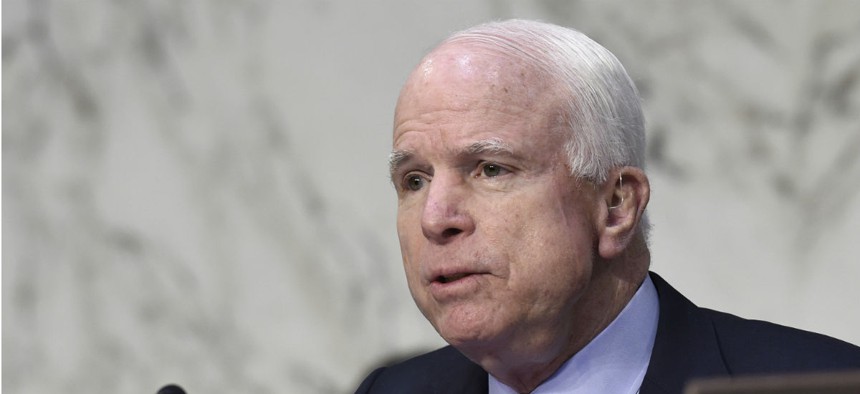Defense Bill Stripped of Language Overturning Contractor Executive Orders
Contractor “religious freedom” and “fair pay” issues punted to incoming Trump team.
The election of Donald Trump had a surprise impact on this month’s House-Senate conference meetings on the fiscal 2017 National Defense Authorization Act.
One of the main sticking points in the bill was whether to include House language on contractor “religious freedom” introduced in May by Rep. Steve Russell, R-Okla., which critics feared would allow contractors to fire LGBT employees protected under a 2014 executive order from President Obama.
But senior Senate Armed Services Committee aides told reporters Tuesday that “since the election, other paths have opened up” for addressing that executive order and the “Fair Pay and Safe Workplaces” rule, which contractors have opposed. The bill's language on religious freedom and fair pay has therefore been removed from the compromise bill.
“The [National Defense Authorization Act] was always an imperfect remedy,” the aides said the night before the long-awaited conference report and merged bill were set to be posted.
The 55th annual version of the mammoth bill, scheduled to be made public at noon Wednesday, includes a 2.1 percent pay raise for troops and new TRICARE cost-sharing obligations for future recruits. Provisions impacting contractors include a restructuring of the Defense Office of Acquisition, Technology and Logistics, currently led by Frank Kendall, and reshuffling the Office of the Defense Secretary to update the 1986 Goldwater-Nichols Act.
For months, Armed Services Committee Chairman Sen. John McCain, R-Ariz., has pushed to “separate acquisition from research and engineering functions,” as the aides put it. The duties of the current job would be split between two new positions: the undersecretary of Defense for research and engineering, and the undersecretary for management and support.
“How many private-sector corporations have acquisition and engineering folded into one?” the aides asked. “None. It’s two different skill sets and cultures. One is low risk, the other is creative.”
On Goldwater-Nichols, the compromise bill would remove “all mandatory structures” for the number of deputy secretaries and leave the number up to the Pentagon, said the aides, adding that the conference committee addressed 1,259 provisions (some 400 more than last year’s), and retained 961 as written.
The staffers said they expect the House to vote on the bill on Friday, and the Senate early next week.
Also on Wednesday, a contractors' agenda item from last year’s NDAA appeared in the Federal Register as a proposed rule being implemented by Kendall and acquisition counterparts at NASA and the General Services Administration. It would amend the Federal Acquisition Regulation to clarify “that agency acquisition personnel are permitted and encouraged to engage in responsible and constructive exchanges with industry, so long as those exchanges are consistent with existing law and regulation and do not promote an unfair competitive advantage to particular firms.”




